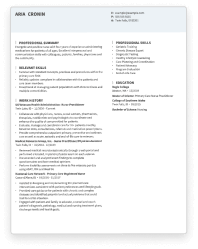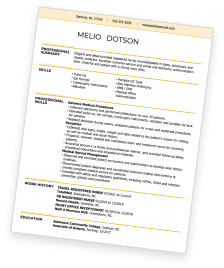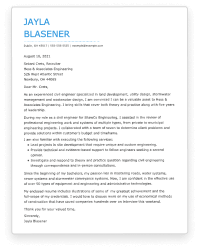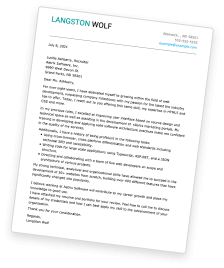Reporting Analyst Resumes: Overview
As a reporting analyst in statistics, your role is crucial in deciphering data trends. You use your data interpretation, reporting, and statistical analysis expertise to guide business decisions.
You are highly skilled in the art of data visualization and statistical modeling and have proficiency in relevant software.
Reporting analysts can be found working in many different settings, including:
- Corporate Analytics Teams
- Financial Institutions
- Government Agencies
- Healthcare Organizations
- Academic Institutions
Creating a professional resume is crucial to landing the reporting analyst job of your dreams.
Explore our professionally designed resume examples and downloadable templates to get started!
Reporting Analyst Resume: Choose a Format
Choosing a resume format is an essential step in crafting your reporting analyst resume. Your resume format significantly impacts how your expertise is presented to potential employers.
There are three formats to consider: chronological, functional, and combination. Let’s take a closer look at each one!
Chronological Resumes for Reporting Analyst
A chronological resume is a go-to format for experienced reporting analysts because it emphasizes work history. This format allows you to showcase your career progression over time.
The chronological format is highly compatible with applicant tracking systems (ATS) and familiar to most employers.
By highlighting your data-driven achievements in chronological order, employers can easily trace your growth and development in the field of statistical analysis.
This format includes a detailed list of your job history, providing your job title, employer name, and dates of employment. Then, under each job entry, you create bulleted sentences to describe your job responsibilities and accomplishments.
Functional Resumes for Reporting Analyst
A functional resume format is ideal for less experienced reporting analysts aiming to emphasize their statistical and analytical skills rather than relevant work experience. This format lets you highlight specific skills and competencies directly related to reporting analysis.
By spotlighting your capabilities, you can effectively communicate your proficiency in statistical tools, data interpretation, and analytical thinking. It is an excellent choice for someone who is transitioning from a different career or who is just starting out.
A word of caution when choosing a functional resume– employers place high value on work history and may prefer a different format. For that reason, functional resumes aren’t very compatible with applicant tracking systems.
Combination Resumes for Reporting Analyst
For reporting analysts with limited reporting analyst experience, the combination resume offers the best of both worlds. This format blends chronological and functional elements, allowing you to showcase your work history while placing a strong emphasis on key skills and achievements.
This format places your skills and qualifications above your work experience on the resume, drawing attention to your ability to do the job before delving into your work history.
If you have a diverse work history but strong statistical analysis skills, the combination resume ensures that both your professional journey and specific competencies are highlighted effectively.
Choosing a Resume Format
Selecting the right resume format is a key step in building a resume for a reporting analyst job. While all three formats have their merits, the chronological format is often preferred in this field.
Its compatibility with ATS and adaptability to various experience levels make it a solid choice for any candidate.
If you are worried about including work experience that is not related to data analysis, don’t be! You can customize your work history to demonstrate skills and experience that transfer well to a reporting analyst position.
For example, you can highlight important skills like teamwork, creating reports, or explaining complex information to non-technical people.
How to Write a Reporting Analyst Resume
Once you choose a resume format, you can start crafting a compelling reporting analyst resume. Your resume will consist of five key sections:
- Contact Information
- Resume Summary or Objective Statement
- Work History
- Skills
- Education
Once you have created those five sections, consider adding optional sections to fill out your resume and showcase your ability to do the job.
Let’s explore how to write each section to catch the attention of hiring managers and recruiters.
Contact Information
First, provide your contact information so potential employers can contact you for an interview! Include your full name, city and state, phone number and professional email address.
You can also include your LinkedIn profile if you like, as long as your profile picture and information are current.
Your contact section can be formatted in a variety of ways depending on the resume template you choose, but may look something like this:
John Doe
Nashville, TN
john.doe@email.com
(555) 123-4567
linkedin.com/in/johndoe
Summary or Objective
Next, you will craft either a resume summary or an objective statement to briefly introduce your qualifications and entice potential employers to read the rest of your resume.
A resume summary is a brief 2-3 sentence overview of your reporting analyst experience and most relevant skills. It is a good choice if you have work experience in statistical analysis.
A good resume summary for a reporting analyst resume may say something like this:
“Results-driven reporting analyst with 7+ years of experience in statistical analysis. Proven track record of optimizing data processes, resulting in improved reporting efficiency and actionable insights for decision-makers.”
A resume objective, on the other hand, is best suited to a recent graduate who is looking for the first reporting analyst position. This concise statement emphasizes your career goals and enthusiasm for the job.
Here’s an example of an objective statement for a reporting analyst resume:
“Aspiring reporting analyst seeking an opportunity to apply academic knowledge in statistics to drive data-driven decision-making. Eager to contribute analytical skills and learn from experienced professionals in a dynamic work environment.”
Whether you choose a summary or an objective statement, use keywords from the reporting analyst job description to make your resume more ATS-friendly.
Work History
The work history section is your chance to shine. This section can be tailored to demonstrate your alignment with the reporting analyst job you are applying for.
To create your work history section, make a list of your previous jobs, providing your job title, name of the company, city, and state where they are located, and the dates you worked there.
Then, write at least three bulleted sentences detailing your experience under each job entry.
To make your work history section more engaging, use action verbs like analyzed, assembled, evaluated, and calculated to help potential employers visualize your accomplishments.
Quantify accomplishments with numbers and percentages where possible to demonstrate your impact in each role and demonstrate your ability to use data to make an impression.
For example, a job entry in your work history section of a reporting analyst resume might look like this:
Reporting Analyst | XYZ Corporation | 2/2018 – 5/2022
- Analyzed complex data sets, optimizing reporting processes and improving efficiency by 20%.
- Implemented statistical models, leading to more accurate predictions and data-driven insights.
- Enhanced data integrity by paying meticulous attention to detail when reviewing and analyzing data maintenance processes.
Skills
Next, you will create a dedicated skills section highlighting specific skills crucial for a reporting analyst. Again, this section should be tailored to each specific job application, focusing on the most relevant hard skills and soft skills needed for success as a reporting analyst.
In addition to including your technical skills, include soft skills like communication and teamwork to create a complete picture of your professional abilities.
Although you will want to gear your resume towards the specific reporting analyst job description you are applying to, here are some of the most popular hard and soft skills to give you an idea of what you may write down:
Top 5 Hard Skills for Reporting Analyst Resumes
- Data Visualization Tools: Proficiency in data visualization tools, like Tableau or Power BI, is crucial for reporting analysts to present complex statistical findings in an easily understandable format, facilitating informed decision-making.
- Statistical Modeling: Mastery of statistical modeling languages like Python and R enables reporting analysts to develop accurate models, providing in-depth insights into data trends and patterns crucial for strategic decision-making.
- Database Management: A strong command of SQL is essential for reporting analysts to manage and retrieve data from databases efficiently, ensuring the accuracy and reliability of statistical analyses.
- Advanced Excel Skills: Reporting analysts heavily rely on Excel for data manipulation and analysis. Advanced Excel skills, including pivot tables and complex formulas, enhance efficiency in handling large datasets.
- Reporting Tools: Proficiency in various reporting tools, such as Google Data Studio, allows reporting analysts to create visually appealing and comprehensive reports, enhancing communication of statistical insights.
Top 5 Soft Skills for Reporting Analyst Resumes
- Analytical Thinking: Reporting analysts need strong analytical thinking to dissect complex datasets, identify patterns, and draw meaningful conclusions, contributing to effective data-driven decision-making.
- Attention to Detail: Given the precision required in statistical analysis, acute attention to detail is vital for reporting analysts to ensure accuracy in data interpretation and reporting.
- Communication Skills: Effective communication is crucial for reporting analysts to convey complex statistical insights in a clear and understandable manner, facilitating collaboration with stakeholders across various departments.
- Problem-Solving: Reporting analysts often encounter challenges in data analysis. Strong problem-solving skills enable them to overcome obstacles and find innovative solutions, ensuring the accuracy and reliability of statistical outcomes.
- Time Management: Meeting deadlines is a common aspect of reporting analyst roles. Effective time management skills help reporting analysts handle multiple tasks efficiently, ensuring the timely delivery of accurate statistical analyses and reports.
When you figure out which specific skills you want to add to your resume, ones that are the most relevant, you can list your skills under a section in bullets, such as:
SKILLS
- Data Visualization: Tableau, Power BI
- Statistical Modeling: Python, R
- Database Management: SQL
- Communication: Email, Public Speaking
- Time Management: Scheduling, Calendar Organization
Education
Next, you will detail your educational background, emphasizing degrees in statistics, mathematics, or related fields. List your degree, the name of the institution, and the city and state where it is located.
For example, an education section for a reporting analyst may look like this:
Master of Science: Business Analytics | ABC University | Dayton, Ohio
You can include undergraduate degrees if they are relevant to statistical analysis, such as a bachelor’s degree in finance or statistics. Or, if you are still working on your degree, you can also include relevant coursework that aligns with the job description.
Additional Sections
Now that you have carefully crafted the five key sections of your resume, you can consider including some additional sections in your resume.
If space allows, you can include sections like certifications, volunteer experience, awards and hobbies or professional associations you belong to. These sections create a complete picture of your qualifications and fit for the role.
Top Certifications for Reporting Analysts
Including certifications adds credibility to your resume and demonstrates your commitment to professional excellence. Some of the top certifications for a reporting analyst resume are:
- Power BI Data Analyst Professional Certificate: Demonstrate your knowledge of SQL and ability to extract business insights using advanced querying.
- SAS Data Science Certification: Validate your ability to manipulate and gain insights from big data with a variety of SAS and open source tools, make business recommendations with complex machine learning models and deploy models at scale.
- Google Data Analytics Professional Certificate: Obtain professional certificates from Google to show your expertise in R programming, Python, Tableau, and more.
7 Tips For Writing A Reporting Analyst Resume
Emphasize Business Improvements: Highlight specific instances where your statistical analysis directly contributed to business improvements. Showcase achievements such as optimizing reporting processes, improving efficiency, or providing actionable insights.
Quantify your results for added impact, specifying a percentage of improvement or dollar amount of cost savings. Doing so demonstrates the tangible impact of your analytical skills and makes your resume more compelling for hiring managers.
Tailor Your Resume for Each Application: Customize your resume based on the specific job description. Align your skills and experiences with the requirements outlined in the job posting.
Tailoring your resume ensures that it resonates with the employer’s needs and increases the chances of your application standing out in a competitive field.
Use Action Verbs: Begin each bullet point with powerful action verbs such as “Analyzed,” “Optimized,” or “Implemented.”
Action verbs convey a sense of proactivity and impact, making your contributions more dynamic and engaging for hiring managers. It enhances the readability of your resume and underscores your active role in statistical analysis.
Showcase Technical Skills: Highlight your proficiency in technical skills relevant to reporting analysis, such as data visualization tools (Tableau, Power BI), statistical modeling languages (Python, R), and database management (SQL).
Clearly outlining your technical expertise demonstrates your readiness to tackle the technical demands of the role, making your resume more attractive to employers.
Include Keywords: Optimize your resume with relevant keywords from the job description. Many employers use Applicant Tracking Systems (ATS) to filter resumes.
Including industry-specific keywords ensures that your resume passes through ATS scans and reaches the hands of hiring managers. This strategic approach increases your visibility and chances of being shortlisted.
Use a Visually Appealing Design: Ensure that your resume has a clean, professional design that catches the eye and is easy to read. Use consistent formatting, clear headings, and bullet points to enhance readability.
A well-organized design makes it effortless for hiring managers to navigate your resume, focusing on your achievements and skills.
Proofread Thoroughly: Eliminate errors by thoroughly proofreading your resume. Typos and grammatical mistakes can create a negative impression.
A polished, error-free resume demonstrates your attention to detail and professionalism, reinforcing your suitability for a reporting analyst role. Proofread with fresh eyes or use online tools to ensure accuracy.
Helping Job Seekers Like You


Use Hloom's Resume Builder
Key Takeaways
- Tailor your reporting analyst resume for each job application for maximum impact.
- Choose the right format to highlight your expertise.
- Use action verbs to emphasize achievements and numbers or percentages to quantify results.
- Showcase technical skills and industry experience alongside soft skills like communication and teamwork.
- Optimize for applicant tracking systems by using keywords from the industry.
Use Our Cover Letter Builder












